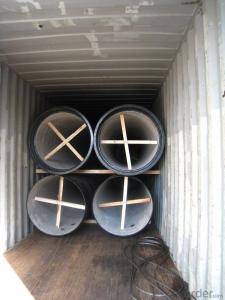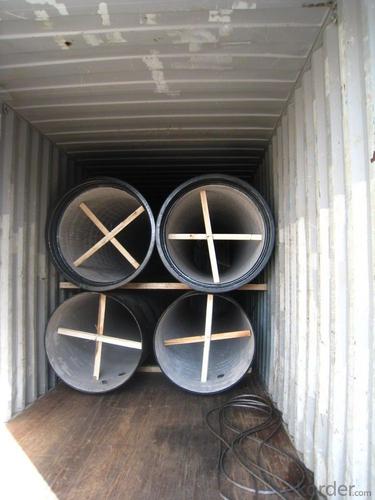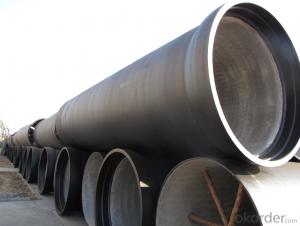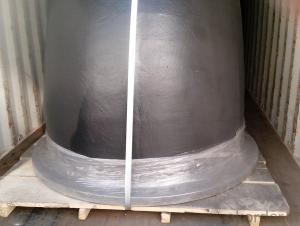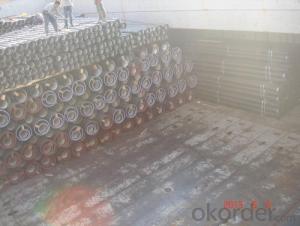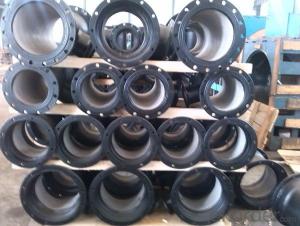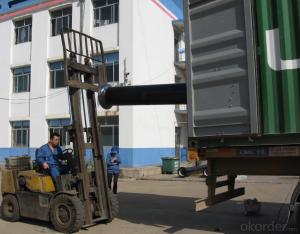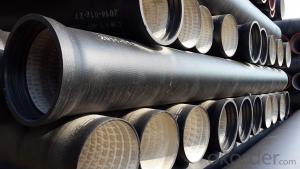DUCTILE IRON PIPE DN1000 C
- Loading Port:
- Tianjin
- Payment Terms:
- TT OR LC
- Min Order Qty:
- -
- Supply Capability:
- 30000Tons m/month
OKorder Service Pledge
OKorder Financial Service
You Might Also Like
CNBM ductile iron pipe ranges from DN80-DN1600mm (T-Type, Class K9), effective length 6m, comply with ISO2531 Standard
Company Profile
CNBM International Corporation is the leading production base and renowned supplier of Ductile Iron Water Pipe systems of both potable and waste water in China. We are constantly looking to develop high quality products to ensure the longest service life and wonderful performance.
CNBM Pipelines regard quality as the essential factor leading to successful business. Every pipe is tested in accordance with BS EN545 (water application) or BS EN598 (sewer application). CNBM Pipelines products comply with and are tested according to the relevant European and International Standards. Our pipes are manufactured under the quality management system BS EN ISO 9001. After years of efforts, CNBM Pipelines has built up great reputation in terms of quality and service among customers worldwide
Product Introduction
CNBM ductile iron pipe ranges from DN80-DN1600mm (Tyton, T-Type, Class K7/K8/K9), effective length: 6m, complying with BS EN545/EN598/ISO2531/BS4772.
Specification& Payment terms
Internal lining: Pipes shall have an internal cement mortar lining in acc with ISO4179.
External coating: Pipes shall be externally coated with metallic zinc spray plus a further layer of resin painting to ISO8179.
Gasket: 100% SBR/NBR/EPDM gasket in accordance with ISO4633.
Packing: Pipes from DN100 to DN300 be bundled with steel belts, the others are in bulk.
Payment term: By 30% T/T advance payment + 70% Irrevocable L/C at sight.
Packing: In bulk vessel or in container.
- Q: What is the weight of ductile iron pipes compared to other materials?
- Ductile iron pipes are generally heavier compared to other materials commonly used in the construction industry. The weight of ductile iron pipes can vary depending on the specific size and dimensions, but they are typically heavier than materials such as PVC, HDPE, and steel pipes. This increased weight is primarily due to the dense nature of ductile iron, which provides durability, strength, and resistance to corrosion. However, the weight of ductile iron pipes also contributes to the challenges associated with transportation, installation, and handling, requiring appropriate equipment and techniques to ensure safe and efficient installation. Overall, while ductile iron pipes may be heavier than other materials, they offer numerous advantages in terms of longevity and performance in various applications.
- Q: Can ductile iron pipes be used for stormwater drainage?
- Indeed, stormwater drainage systems can utilize ductile iron pipes. Renowned for their robustness and endurance, ductile iron pipes are apt for numerous purposes, including stormwater drainage. Notably, these pipes possess remarkable tensile strength, enabling them to endure substantial loads and pressure, rendering them optimal for transporting significant volumes of stormwater. Furthermore, the smooth interior surface of ductile iron pipes diminishes friction and encourages efficient water flow, reducing the likelihood of obstructions and congestion. Through meticulous installation and upkeep, ductile iron pipes can furnish a dependable and enduring resolution for stormwater drainage.
- Q: Can ductile iron pipe be used for nuclear power plants?
- Certain applications within nuclear power plants can utilize ductile iron pipe. Ductile iron pipe is renowned for its strength, durability, and resistance to corrosion, which makes it suitable for a variety of industrial and infrastructure projects. However, when considering nuclear power plants, specific factors must be taken into account. Safety and reliability of materials used in nuclear power plants are of utmost concern. Although ductile iron pipe meets many requirements, it may not be the optimal choice for critical applications involving the transportation of radioactive fluids or the handling of high-pressure or high-temperature systems within the plant. These particular applications often necessitate materials with exceptional resistance to corrosion, stress, and radiation damage. Materials such as stainless steel, nickel alloys, or even specialized materials like Inconel are commonly employed in nuclear power plants due to their superior properties. These materials offer enhanced resistance to radiation-induced embrittlement, corrosion, and high-temperature and high-pressure conditions. Therefore, while ductile iron pipe may find utility in non-critical applications within nuclear power plants, it is crucial to consult industry experts, engineers, and adhere to relevant nuclear safety regulations in order to determine the most suitable materials for specific applications within the plant.
- Q: How do ductile iron pipes handle soil erosion?
- Ductile iron pipes are renowned for their exceptional strength and durability, rendering them highly resistant to the erosion of soil. The specific engineering of the material used in these pipes ensures their ability to withstand the detrimental effects of soil erosion, thereby guaranteeing long-lasting and dependable infrastructure. The composition of ductile iron pipes comprises a blend of iron, carbon, and other alloying elements, providing the necessary strength and resilience to withstand the forces exerted by soil erosion. These pipes possess a greater tensile strength than conventional cast iron pipes, enabling them to withstand pressure without deforming or cracking. Furthermore, ductile iron pipes boast a protective layer known as cement mortar lining, which acts as a barrier between the pipe and the surrounding soil. This lining offers an additional layer of resistance against corrosion and erosion caused by the chemical composition or abrasive particles present in the soil. Consequently, ductile iron pipes remain intact and continue to function effectively, even in areas experiencing high rates of soil erosion. In terms of installation, ductile iron pipes are specifically designed to be buried underground, ensuring their robust protection from direct contact with the soil. Additionally, their jointing systems are designed to provide secure and watertight connections, minimizing the risk of soil infiltration and subsequent erosion. Overall, ductile iron pipes have a proven track record of effectively combating soil erosion due to their superior strength, protective linings, and appropriate installation techniques. They offer a reliable and long-lasting solution for water and wastewater infrastructure, even in regions prone to soil erosion.
- Q: How can the cast iron pipe be connected?
- Drain pipe or water supply pipe?. The drainage tube as stated on the first floor, water supply pipe of T type and K type and S type, currently dominated by T, a lot of Xinxing Pipes as well, when connecting with T type rubber ring socket socket into the brand, after inserted with oil. The installation team is generally safe.
- Q: Is there any cast iron pipe used in the fire hose?
- I don't know, I only know that the fire pipes produced by our company is the base tube is a pipe, and then coated with a corrosion and non-toxic, long service life, we are Suzhou Yuyao Pipe Industry Co. Ltd. is a professional production of the manufacturers, oh
- Q: Can ductile iron pipes be used for rainwater harvesting systems?
- Yes, ductile iron pipes can be used for rainwater harvesting systems. Ductile iron pipes are known for their durability and strength, making them suitable for various applications, including rainwater harvesting. These pipes are resistant to corrosion and can withstand high pressure, which is essential for transporting rainwater from the collection point to storage tanks or distribution systems. Additionally, ductile iron pipes have a long lifespan, reducing the need for frequent replacements and making them a cost-effective choice for rainwater harvesting systems.
- Q: Can ductile iron pipe be used for hydroelectric power generation?
- Yes, ductile iron pipe can be used for hydroelectric power generation. Ductile iron is a type of cast iron that exhibits high strength, durability, and excellent corrosion resistance. These properties make it suitable for various applications, including the construction of hydroelectric power generation systems. Ductile iron pipes can be used for water conveyance in hydroelectric power plants. They are commonly used for penstocks, which are large pipes that carry water from the reservoir to the turbines. Penstocks are typically subjected to high pressure and flow rates, and ductile iron pipes can withstand these conditions. Furthermore, ductile iron pipes are resistant to corrosion, which is crucial in hydroelectric power generation. The water used in the power generation process can be highly corrosive due to its composition and the presence of impurities. Ductile iron's corrosion resistance ensures that the pipes remain robust and durable over time, reducing maintenance and replacement costs. Additionally, ductile iron pipes can be easily joined using various methods such as flanged, mechanical, or push-on joints. This allows for efficient and reliable installation, ensuring the integrity of the water conveyance system in hydroelectric power plants. In summary, ductile iron pipe is a suitable choice for hydroelectric power generation due to its strength, durability, corrosion resistance, and ease of installation. Its use in penstocks and other water conveyance systems contributes to the efficient and reliable operation of hydroelectric power plants.
- Q: Are ductile iron pipes suitable for use in seismic areas?
- Yes, ductile iron pipes are suitable for use in seismic areas. Ductile iron is a strong and durable material that can withstand seismic forces and ground movements associated with earthquakes. Its flexibility and high tensile strength make it resistant to cracking or breaking under extreme conditions. Additionally, ductile iron pipes have been successfully used in seismic areas for many years, proving their reliability and suitability. However, it is important to ensure that proper installation techniques and seismic design guidelines are followed to maximize their performance and minimize any potential risks.
- Q: What is the weight of a typical ductile iron pipe?
- The weight of a typical ductile iron pipe can vary depending on its size and wall thickness. Generally, ductile iron pipes are available in sizes ranging from 3 inches to 64 inches in diameter. The weight of these pipes can range from a few pounds per foot for smaller sizes to several hundred pounds per foot for larger diameters. Wall thickness also plays a significant role in determining the weight of the pipe. Thicker walls will result in a heavier pipe. For instance, a 10-inch ductile iron pipe with a wall thickness of 0.25 inches may weigh around 26 pounds per foot, whereas a 24-inch ductile iron pipe with a wall thickness of 0.5 inches can weigh approximately 175 pounds per foot. It is important to consult specific manufacturer specifications or engineering references to determine the precise weight of a particular ductile iron pipe.
Send your message to us
DUCTILE IRON PIPE DN1000 C
- Loading Port:
- Tianjin
- Payment Terms:
- TT OR LC
- Min Order Qty:
- -
- Supply Capability:
- 30000Tons m/month
OKorder Service Pledge
OKorder Financial Service
Similar products
Hot products
Hot Searches
Related keywords
